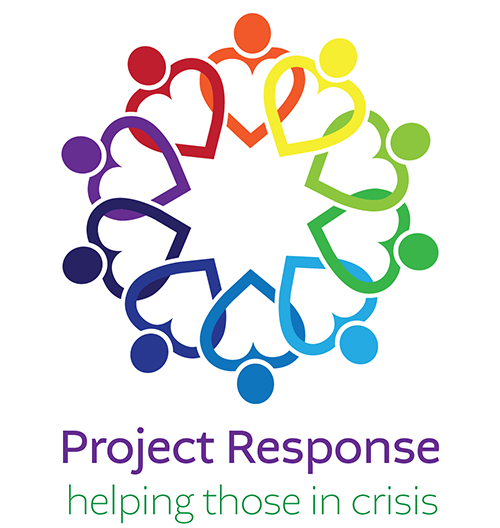How can I help Project Response?
I am a victim of sexual assault. What should I do?
How should I help a friend who is a victim of sexual assault or domestic violence?
Common myths about rape and sexual assault
More frequently asked questions about domestic violence and sexual assault
How can I help Project Response?
Helpful contributions you are able to make include the following:
- Monetary donations (donate button on the homepage or Facebook page or by using PayPal)
- Blankets
- Diapers/Pull-Ups
- Baby wipes
- Baby soap
- Deodorant
- Gas Cards
- Kleenex
- Shampoo/Conditioner
- Toothpaste/Toothbrushes
- Gift cards
- Toilet tissue
- Paper towels
- Feminine hygiene products (tampons and pads)
- Razors
- Laundry detergent
- Body wash/soap
- New men’s & women’s socks
- New men’s & women’s underwear
Volunteer! Project Response always needs volunteers to help provide services to the community. As a Volunteer, you can:
- Staff the crisis line, Provide legal and medical advocacy to victims of spousal abuse, sexual assault, and incest.
- Educate the community about domestic violence and related issues.
- Provide needed counseling services.
- Facilitate one of our groups.
- Provide child care.
- Assist with office operations.
- Volunteers do not need prior experience and are provided with one-on-one training.
How should I help a friend who has been sexually assaulted?
Remember that your support is needed the most. It was not his/her fault and whatever happened, this person did nothing to deserve or provoke it. Listen without judging and respect his/her decision and help them become stronger and safer.
If your friend is a victim of sexual assault or domestic violence, he or she may be experiencing:
- Shock
- Denial
- Disbelief
- Fear
- Anger
- Helplessness
- Mood Swings
- Embarrassment
- Irritability
- Depression
- Inability to concentrate
- Disturbance in eating and sleeping habits
Ways to offer support if someone has been sexually assaulted or domestically abused:
- Listen, don’t judge. Now is the time for you to offer non-judgmental support to your friend/ significant other/ family member.
- Offer shelter. If it is at all possible, stay with him/her either at their place or have him/her spend the night at your place.
- Be available. She or he may need to talk often and sometimes at odd hours.
- Offer Comfort. She or he has experienced something traumatic and needs support and comfort.
- He or she is NOT to blame. Let her/him know it is not his/her fault for the assault.
- Be patient and understanding. It can be very difficult to watch someone you love suffer and in those cases it is not uncommon to try to “speed up” the healing process.
- Do NOT be overly protective. When someone we love has been hurt, it is natural to want to protect them.
After rape or abuse, survivors may be openly upset, even hysterical, or they may be numb and seemingly calm. You can help her/him to:
- Feel safe. Someone who has experienced a sexual assault has been violated in a very personal and traumatic way.
- Be respectful. It is important that you communicate support and acceptance to someone who has disclosed a sexual assault experience to you.
- Know that it was NOT their fault. Most victims of sexual assault feel as though they are somehow to blame for their own assault.
- Regain control of his/her life. Because of the nature of the crime, sexual assault victims often feel a total loss of control due to the assault.
- Obtain medical assistance. Medical attention immediately after the assault is important for treatment of any physical injuries, testing for seually transmitted infections, HIV, and/or emergency contraceptives.
More FAQs about domestic violence and sexual assault
Why do someone put up with abuse?
- Fear, shame or isolation.
- Loneliness often seems worse than abuse.
- Pressure to have a boyfriend/girlfriend.
- Thinking they can “fix” or help.
- Feels the abuse is their fault, if only they did “xyz” better.
How can you help a friend who is being abused?
- Let them talk, just listen and believe them.
- Understand them, be there and try not to judge them.
- Encourage them to get help and help them find someone to talk to.
How can you be a friend to someone who is abusive?
- Confront them with what they are doing and give them your opinion.
- Refuse to accept their excuses, don’t let them minimize the abuse.
- Encourage them to talk to someone and get help.

